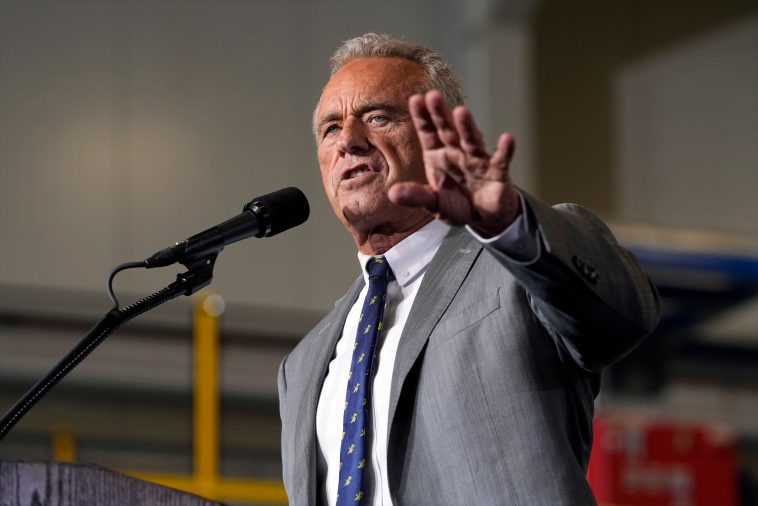Prior to the recent election, Robert F. Kennedy Jr. publicized hostility towards the Food and Drug Administration (FDA) and its objective scientists via social media. Kennedy’s message indicated that the FDA’s perceived detrimental approach towards public health was nearing its conclusion. He criticized the organization for their supposed stringent control over certain unproven treatments for COVID-19 such as ivermectin and hydroxychloroquine.
In his discourse, Kennedy not only addressed the members of the FDA, but also made two prominent declarations, firstly, to maintain their records and secondly, to be prepared for change. This hard-hitting stance resulted from President Donald Trump’s proposition to inaugurate Kennedy as secretary of Health and Human Services. This significant position would offer Kennedy the authority to mold crucial public health establishments including the FDA, the National Institutes of Health, and the Centers for Disease Control and Prevention.
This high-power proposal has invoked considerable distress within the scientific community. The potential implications upon the national public health infrastructure and overall public health could be severe under Kennedy’s leadership, according to genuine scientists. Their concerns stem from Kennedy’s open stance against vaccination and his affiliations with other pseudoscientific beliefs.
One of Kennedy’s controversial positions has been his aggressive criticism of the COVID-19 vaccines, which have been globally recognized for saving millions of lives. In his remarks, he ironically referred to these life-saving vaccines as ‘the deadliest vaccine ever produced.’ His critical views on vaccination extend beyond the pandemic, as he has previously linked the MMR (measles/mumps/rubella) vaccine to autism, a claim that has been broadly dismissed by the scientific community.
Furthermore, Kennedy’s political discourse isn’t restricted to health matters. He has promoted disturbing, antisemitic views about the origin and distribution of the COVID-19 virus. His baseless theories have suggested racial targeting by a veiled malignant power, alleging that Caucasians and Black people were principally affected, while Jewish people remained untouched.
Kennedy has also advocated unusual and outlandish conjectures about the impact of environmental chemicals on children’s sexual orientation and gender identity, aligning him with infamous conspiracy theorist, Alex Jones. If Kennedy enters the office, there’s a possibility that it could reinforce anti-science policies based on personal ideologies, reminiscent of Trump’s first term which saw a marked impediment on COVID-19 research.
History depicts the disastrous outcomes when policymaking is manipulated by ideologies instead of being shaped by rigorous scientific investigation. A stark example comes from the Soviet Union under Joseph Stalin, where the influence of ideology over science led to severe harvest failure and a calamitous famine. The resulting catastrophe claimed the lives of more than seven million Soviet citizens.
The Soviet experiment was echoed in China during 1959-1961. Mao Zedong’s subjection to pseudoscientific policies, influenced largely by Lysenko’s ideology, ushered in a disastrous famine that was responsible for the loss of tens of millions of lives. We can relate these historical examples to current concerns about a decline in vaccination rates, as they often give way to outbreaks of diseases that could otherwise have been controlled through immunization.
Low vaccination rates lead inevitably to the resurgence of vaccine-preventable diseases. According to the CDC, measles cases in the U.S. have risen sharply, from a mere 13 in 2020 to 277 this year. On a global scale, vaccination lapses have contributed to a 20% increase in measles cases, affecting 10.3 million people worldwide, as reported by the World Health Organization and the CDC.
During his campaign, Trump took a particularly uncompromising stance against schools with vaccination or mask mandates, vowing not to fund them. He didn’t offer specific details, but his general point stands that all 50 states have mandatory vaccination policies, with comprehensive immunization requirements including those for MMR, polio, diphtheria, whooping cough, tetanus, and chickenpox.
Interestingly, despite these mandates, not all states strictly enforce the requirements, resulting in a less diligent approach to vaccine exemptions. Consequently, there’s been a decline in nationwide vaccine coverage–from 95% in 2019 to below 93% in 2023-2024.
Policymakers and citizens alike fear that the rhetoric espoused by Kennedy and Trump regarding vaccines, if it becomes federal policy, could lead to increasing and potentially more significant disease outbreaks. As these concerns abound, the response from the scientific community is starting to coalesce.
And yet, a prevalent trend is the denigration and demonization of scientists as ‘enemies of the people,’ a tactic employed by Kennedy and Trump. This strategy is largely recognized as a means to destabilize public confidence in science.
Crises like these highlight the fact that our understanding of disease and vaccination isn’t derived from the whims of ‘experts.’ Instead, it’s the culmination of empirical data and years of hard-earned public research.
As we consider the societal implications of decisions made or yet to be made, we need to remember the patterns history lays before us, and the importance of preserving the integrity of science and its critical role in policymaking and public health.


